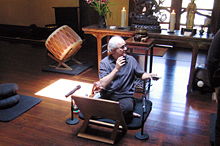Loading AI tools
Scottish Buddhist author and teacher From Wikipedia, the free encyclopedia
Stephen Batchelor (born 7 April 1953) is a Scottish Buddhist author and teacher, known for his writings on Buddhist subjects and his leadership of meditation retreats worldwide. He is a noted proponent of agnostic or secular Buddhism.[1][2][3][4][5][6][7]
Stephen Batchelor | |
|---|---|
 Stephen Batchelor at Upaya Zen Center in New Mexico | |
| Born | 7 April 1953 |
| Nationality | Scottish |
| Occupation(s) | Buddhist author, teacher |
| Spouse | Martine Batchelor |
| Website | www.stephenbatchelor.org |
Batchelor was born in Dundee, Scotland, in 1953. When he was three years old, his family relocated briefly to Toronto, Ontario, Canada, where his parents separated. He relocated with his mother Phyllis (b. 1913) to England, where he was raised in a humanist environment with his younger brother David in Watford, Hertfordshire. He attended Watford Grammar School for Boys, leaving in February 1972.
At age eighteen, he embarked on an overland journey which eventually led him to India. He settled in Dharamsala, the capital-in-exile of the Dalai Lama, and studied with Geshé Ngawang Dhargyey at the Library of Tibetan Works and Archives. He was ordained as a novice monk in the Gelug tradition in 1974. A few months after ordination, he sat a ten-day Vipassana meditation retreat with the Indian teacher S.N. Goenka, which proved a lasting influence on his practice, and aroused his curiosity about other traditions of Buddhism.
He left India in 1975 to study Tibetan Buddhist philosophy and doctrine under the guidance of Geshe Rabten. He initially studied at the Tibet Institute Rikon and later in Le Mont-Pèlerin, both located in Switzerland. During this time, he also assisted Geshé Rabten in establishing the Tharpa Choeling, which is now known as Rabten Choeling.[8] The following year, he received full ordination as a monk. In 1979 he moved to Germany to work as a translator for Geshé Thubten Ngawang at the Tibetisches Institut in Hamburg.
In April 1981, Batchelor travelled to Songgwangsa Monastery in South Korea to undergo training in Zen Buddhism under the guidance of Kusan Sunim. At the monastery, he met Martine Fages, a Frenchwoman who had ordained as a nun in 1975. He remained in Korea until the autumn of 1984, when he left for a pilgrimage to Buddhist sites in Japan, China and Tibet.
Following the death of Kusan Sunim, Batchelor and Martine Fages laicised in February 1985 and married in Hong Kong, then returned to England and joined the Sharpham North Community near Totnes, Devon. Over the course of the next fifteen years Batchelor lived at Sharpham, he became coordinator of the Sharpham Trust[9] (1992) and co-founder of the Sharpham College for Buddhist Studies and Contemporary Enquiry (1996). Throughout this period he worked as a Buddhist chaplain at Channings Wood Prison. From 1990 he has been a Guiding Teacher at Gaia House meditation centre in Devon and since 1992 a contributing editor of Tricycle: The Buddhist Review. In August 2000, he and Martine moved to Aquitaine, France, where they live in a village near Bordeaux.
As a lay Buddhist author, teacher, and self-designated scholar,[10] he has increasingly turned his attention to the earliest teachings of Buddhism as recorded in the Pali canon. Additionally, he has shown an increasing interest in Hellenistic philosophies, particularly the skeptical philosophy of Pyrrhonism[11] and Montaigne's approach to Pyrrhonism.[12][page needed]
Batchelor is a member of the core faculty of Bodhi College, which focuses on interpreting the early texts of Buddhism, such as the Pali Canon, in a manner applicable to the modern world.[13] He is also a member of the Advisory Board of the Center for Pragmatic Buddhism.[14][15][16] [17] [18]
Batchelor authored the libretto for MĀRA: A Chamber Opera on Good and Evil (2017).[19] Its music was composed by Sherry Woods.[20]
Seamless Wikipedia browsing. On steroids.
Every time you click a link to Wikipedia, Wiktionary or Wikiquote in your browser's search results, it will show the modern Wikiwand interface.
Wikiwand extension is a five stars, simple, with minimum permission required to keep your browsing private, safe and transparent.